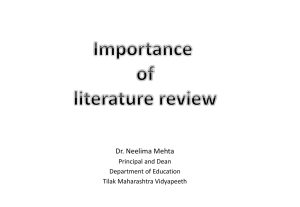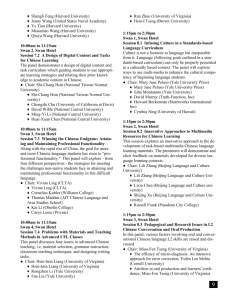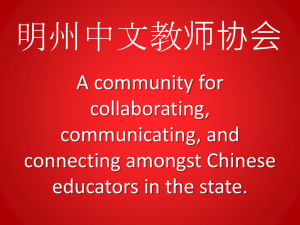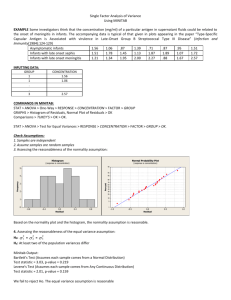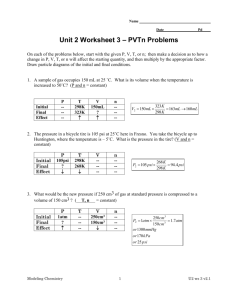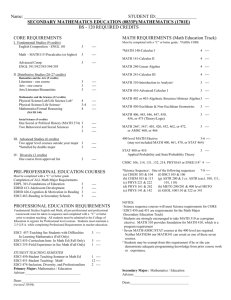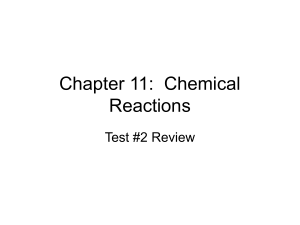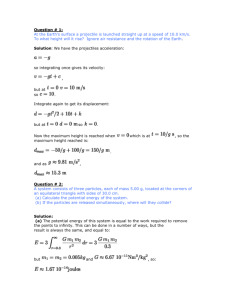8.1-context and meaning
advertisement
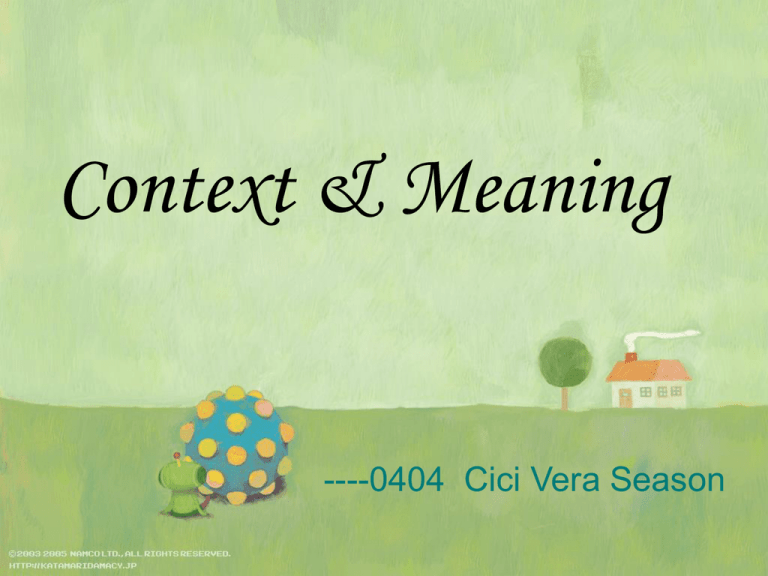
Context & Meaning ----0404 Cici Vera Season It is a difficult operation. 1. A surgical operation performed on a human being or an animal; 2. A strategic movement of troops and ships; 3. A financial transaction; 4. Something related to mathematics; 5. The way a machine works. What is context? A: In a narrow sense It refers to the words, clauses, sentences in which a word appears. This is known as linguistic context or co-text which may cover a paragraph, a whole chapter and even the entire book. B: In a broad sense It includes the physical situation as well, which embraces the people, time, place, and even the whole cultural background. It is called extra-linguistic or non-linguistic context Types of context Two types of context: Linguistic context Extra-linguistic context a. situational context b. cultural context Extra-linguistic context context — the time, place, participants and their relationship. Cultural context — the whole culture background (the social custom shared by people of a certain speech community, including politics, economy, philosophy, technology, history, etc.) Situational Situational context In different situations (time, place, etc.), the same utterance may have different meanings. E.g. It is time to go aboard. Example1 John is like a fish. Situation A: It is said when John is swimming. Interpretation: John swims well. Situation B: It is said at a party. Interpretation: John drinks a lot of wine. Situation C: It is said when people discuss about John’s character. Interpretation: John is as cold as a fish. (indifferent) Example 2 Mary: Can you open the door? Jack: Yes, I can. If Jack goes to open the door after this, then the word CAN indicates a request. If Jack doesn’t go to open the door after this, then the word CAN indicates a kind of ability. Then the Jack’s answer is an indirect refusal. Example3 The classroom is noisy, the students are in a mess. The teacher comes in, Teacher: Order! A student: Beer! All of the students burst into laughter. The naughty student misunderstands the teachers’ meaning deliberately. Example 4 The oldest abolitionist in the House of Commons (A.废奴主义者, B.废除主义者,C.主张废除死刑者) If this phrase is put in the context of 1960s in England, the word abolitionist means a person who favors abolition of capital punishment (主张废除死刑的人) If this phrase is put in the context of 1920s in America, then an abolitionist is a person who favors abolition of wine-prohibition. (主张废除禁酒法令的人) Cultural context In different cultures, the same lexical term may not mean the same thing to people of different culture backgrounds. Example1 Dog in different cultures In English culture: “Love me, love my dog.”(爱屋及乌) “a lucky dog” (指称幸运儿) “Every dog has its day.”(人人皆有得意日) In Chinese culture: “狗头军师”、“狼心狗肺”、““狗急跳墙”、 “狗仗人势”、“狗拿耗子”、“狗胆包天”、“狗 腿子”、“狗日的”、“狗嘴里吐不出象牙”、“癞 皮狗”以及“狗改不了吃屎”等等,把天下所有的狗 都骂了个“ 狗血淋头”。 Bear In Chinese culture ---- stupidity, clumsiness In Russian culture ---- friendliness Calf In Chinese culture ---- “初生牛犊不怕虎” In English culture ---- stupid young people Red vs. 红色 In English culture ---- misfortune, cruelty, disaster, passion, violence, etc. have red hands(犯杀人罪) red tape(官样文章) painted the town red(狂欢、胡闹) waving a red flag (to irritate sb.) In Chinese culture --- symbol of revolution, good luck 王维的诗《相思》:“红豆生南国,春来发几枝,愿君多采 撷,此物最相思。”因此,“红豆”的英译不是red pea,而 是love pea。 Individualism vs.个人主义 In western culture: doing things in their own way, not imitating others, pursuing uniqueness and fulfilling personal values. In Chinese culture: selfishness, pursuing personal benefit. Example 2 I was not Pygmalion, I was Frankenstein. In Greek Mythology, Pygmalion is a sculpture who created a beauty and falls in love with her. Frankenstein is the hero of the novel Frankenstein written by British writer Mary Wollstonecraft Shelley. He was killed by a monster which was created by himself. (我不是一个像皮格马利翁那样创造美,享受美的人; 而是一个像弗兰克斯坦那样自食恶果的人。) Why “swan”? Shakespeare is called “the Swan of Avon”. Why should it be “swan”, but not eagle or pigeon or something else? Because swan can refer to an excellent poet, writer or singer. Thank you!
